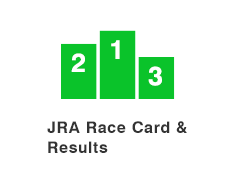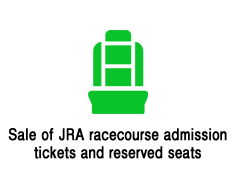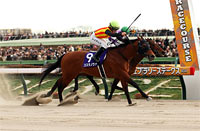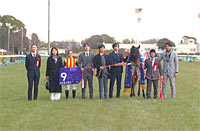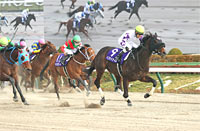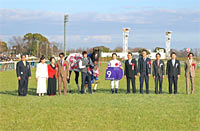2018 News
February Stakes (G1) - PreviewAfter a thrilling wrap to 2017, the first of the top-level races are already upon us. On Sunday, Feb. 18, Tokyo Racecourse hosts the first of the two biggest dirt events in the Japan Racing Association calendar – the February Stakes. This year marks the 35th running of the 1,600-meter competition and 24 horses age 4 and up have been nominated. Sixteen of them will vie for a first-place prize of 100 million yen. In addition to last year’s winner Gold Dream and runnerup Best Warrior, this year’s gate will see a number of new faces with a lot of talent. The mood is mixed and chances are good the return on the year’s first big race will be an attractive one. The Tokyo 1,600 meter course itself is a bit of an oddity, with the first 150 meters of the race actually over the turf. And, depending on the gate position, the difference between the inside gate and the outside gate can mean a difference in turf length of about 30 meters. Some believe this difference gives the outside horses an advantage as they are running over the faster turf, but it’s more likely simply that the 1,600-meter Tokyo dirt course has the longest run from the gate of any JRA dirt race. It’s a full 640 meters to the first turn and outside runners have ample time to get a reading on the competition before maneuvering for position. Despite the distance to the first turn, the pace of the February Stakes is rarely slow. It is a highly competitive race after all, and the first 400 meters are also over a slight downgrade. After that, the track rises briefly about a meter, dips around the third turn and, from 500 meters out, rises nearly 3 meters in the stretch until leveling out from 200 meters before the finish line. The rise in the stretch is steeper than that of the turf track at Tokyo and makes for a grueling test of strength. Lightweights don’t ace the February Stakes and this is clearly reflected in the last seven winners of the race, all who weighed in at over 500kg. As for jockeys, no one shines of recent like Mirco Demuro. Demuro, who also won best winning average in 2017, has ridden two February Stakes winners (Gold Dream in 2017, Moanin in 2016) and is the only foreign jockey to have won the race other than Olivier Peslier (2000 and 2001). Yutaka Take holds the record for most wins of the February Stakes. He rode four winners – Gold Allure in 2003 (at Nakayama over 1,800 meters), Kane Hekili in 2006, Vermilion in 2008 and Copano Rickey in 2015. Moanin holds the race record of 1 minute, 34 seconds flat. The February Stakes will be the 11th race on the Sunday card of 12 at Tokyo Racecourse and post time is 15:40 local time. Here’s a look at the horses likely to be gaining the most attention in the wagering. Gold Dream: Winner of both last year’s February Stakes and the 2017 Champions Cup, Gold Dream was duly recognized with the JRA award for Best Dirt Horse of 2017. After last year’s February Stakes, he traveled to Meydan Racecourse, where he took on the Dubai World Cup and failed to deliver with a last-place finish. Two starts at NAR tracks saw him finish out of the money but he was back on track in the Champion’s Cup where he bagged his second Grade 1 victory. He’s been given the same rotation as he had last year, but was coming off a 12th place finish in the Champions Cup then as opposed to returning from a win this year. Gold Dream is by Gold Allure, whose progeny have now won four February Stakes, and three other Gold Allure progeny (Sunrise Nova, Lalabel, and Meisho Sumitomo), are expected to be in the final lineup. Gold Dream, now 5 years old, has failed to show the consistency he had as a 3-year-old, but obviously still has what it takes to pocket the big money. Only one other horse (Copano Rickey) has won back-to-back editions of this race since it became a Grade 1 event in 2007, but when it comes to the Tokyo 1,600 over dirt, Gold Dream is on the money, with three firsts and one second from four starts. T M Jinsoku: Missing out on the Champions Cup by a neck was T M Jinsoku, a 6-year-old son of Kurofune, winner of the 2001 Japan Cup Dirt. It was T M Jinsoku’s first Grade 1 bid and he ran a strong race in what was a big leap up in class. Skipping the Grade 2 level, T M Jinsoku had gone directly to the top after a second in the Grade 3 Elm Stakes at Sapporo and a win of the Grade 3 Miyako Stakes at Kyoto. Last out, on Jan. 21, he aced the Grade 2 Tokai Stakes (over 1,800 meters at Chukyo). Raced predominately over 1,800 meters, this will be T M Jinsoku’s first time over 1,600 meters and his first time at Tokyo. The gray horse bred at Hidaka T M Bokujo, weighs in just under 500kg and tends to take the lead or race from a forward position. He has been highly consistent in his career and equally swift, which is what “jinsoku” means in Japanese. Of his 25 career starts, T M Jinsoku has finished in the money 19 times, with nine firsts, six seconds and four thirds. His last seven races have brought five wins and two seconds and all were ridden by Yoshihiro Furukawa. Furukawa, who is set for the ride, has not won a Grade 1 race since 2007 and has not won any of his 21 bids over the Tokyo 1,600-meter dirt course. Perhaps, however, this combination can come through a winning one once again. Nonkono Yume: Nonkono Yume was in great form from his debut at the end of 2014, with results that included a second in the Champions Cup in 2015 and a second in the February Stakes in 2016. In June of 2016 he ran second in the top-level Teio Sho at Ohi Racecourse. He was then gelded and the now 6-year-old son of Twining slumped through his next six races. He finished seventh in the February Stakes last year and ninth in the Champions Cup, but returned this year on Jan. 28 for a win of the 1,400-meter Grade 3 Negishi Stakes at Tokyo. Partnered with Hiroyuki Uchida, he narrowly beat Sunrise Nova to the line, but he covered the final 3 furlongs in only 34.2 seconds, moving up the ranks from just two off the rear to a good 2 1/2 lengths ahead of third place Kafuji Take. It was a promising start to the year and may augur well for 2018. Sunrise Nova: The only 4-year-old nominated for the February Stakes is the Gold Allure colt Sunrise Nova. He aced his debut in November 2016 over the Tokyo 1,600 over dirt and moved smartly up in the class to a win of the Grade 3 Unicorn Stakes at the same conditions in June of last year. Despite a total flub of the Musashino Stakes last November, Sunrise Nova returned to form next out for a second in the open class and, last out, second in the Grade 3 Negishi Stakes over a heavy track. Trainer Hidetaka Otonashi said, “He had a perfect ride. If the ground had been dry, I don’t think the winner could have caught him. I think he could have made it. There hasn’t been much time between races but he came out of the last race well even though it was won in record time and the extra distance shouldn’t pose a problem at all.”
|
|







